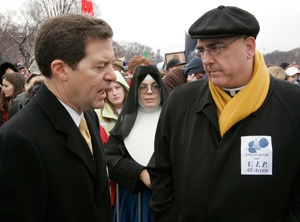WAUWATOSA — Archbishop Joseph F. Naumann of the Archdiocese of Kansas City, Kan., challenged and encouraged post-abortion caregivers to see those who seek their help “as the Lord sees them – beyond their weakness – and to call them to wholeness.”
He made his remarks during an Oct. 28 keynote address at the 13th annual Healing Vision Conference, at the Radisson Hotel in Wauwatosa. Organizers characterized the four-day event, Oct. 26-29, as “a think tank conference of academics, medical professionals, mental health experts and caregivers gathered to share resources and research, and (to) network.”
Archbishop Naumann, 62, employed personal stories and biblical passages as he urged his audience to help clients, “pained and in anger” after undergoing or being otherwise involved in abortions, to:
- experience God’s mercy and be able to forgive themselves;
- “be empowered to forgive others” who might have been instrumental in their abortions;
- realize that God is able to turn “terrible tragedy” into “good in their lives – a great grace.”
The archbishop recalled a young couple, parishioners when he was a newly ordained priest in his native St. Louis more than 35 years ago. The couple’s toddler son was killed after darting into the path of a delivery truck and Fr. Naumann witnessed at close hand the parents’ “profound grief.” Sadly, there was also guilt, something women who experience abortions also often feel.
 Sen. Sam Brownback, R-Kan., talks with Archbishop Joseph F. Naumann of Kansas City, Kan., during a rally before the March for Life in Washington Jan. 22, 2007, in this CNS file photo. Archbishop Naumann challenged post-abortion caregivers attending the Healing Vision Conference 2011 in Wauwatosa last week to see those who seek their help “as the Lord sees them – beyond their weakness – and to call them to wholeness.” (CNS photo/Paul Haring) “I don’t believe there’s any greater human suffering,” Archbishop Naumann said, than the suffering generated by the death of one’s child “at whatever stage of life.”
Sen. Sam Brownback, R-Kan., talks with Archbishop Joseph F. Naumann of Kansas City, Kan., during a rally before the March for Life in Washington Jan. 22, 2007, in this CNS file photo. Archbishop Naumann challenged post-abortion caregivers attending the Healing Vision Conference 2011 in Wauwatosa last week to see those who seek their help “as the Lord sees them – beyond their weakness – and to call them to wholeness.” (CNS photo/Paul Haring) “I don’t believe there’s any greater human suffering,” Archbishop Naumann said, than the suffering generated by the death of one’s child “at whatever stage of life.”
In 1985, the future archbishop became the priest moderator of his archdiocese’s pro-life committee and visited parishes to preach “what we would call today the Gospel of Life.” Following an early pro-life homily, he was approached by an “attractive, professional, single woman who seemed tense and perhaps angry.” Unexpectedly, “she encouraged me to speak boldly and often” about the sanctity of life and shared the tale of the “psychological and spiritual aftermath” of her own abortion a decade earlier. She had been a student at the time, “overwhelmed and scared” by the prospect of single parenthood, and now she was revealing her secret for the very first time.
Although successful in her career, the woman felt “empty,” the archbishop said. She’d had trouble relating to men after choosing to end her pregnancy, and she was sad in the presence of little children and found it difficult to visit doctors and hospitals, as such visits proved remindful of her abortion venue.
The woman hadn’t been to confession in 10 years and “the only thing worse than her grief was (her) guilt,” according to Archbishop Naumann. “She considered herself unworthy of love. Most difficult of all, she wondered if God could forgive her ‘unforgivable’ sin.”
The woman’s feelings of “post-abortion grief and guilt,” noted the archbishop, were “far from unique.” Her grief was “truncated”; the victim could not adequately mourn due to her shame, could not reveal her secret even to her “natural support system of family and friends.” As for guilt, some who have abortions “are able to suppress (it) for many years,” he noted, only to have the guilt resurface with an occurrence such as a miscarriage.
“Jesus spends a significant amount of time healing,” in the New Testament the archbishop reminded his audience of approximately 70 men and women during his hourlong address, and the Lord healed spiritually as well as physically.
Archbishop Naumann cited healing and forgiveness stories in each of the four Gospels – among them the parable of the prodigal son, “or perhaps better titled ‘the forgiving father.’” The archbishop then posed the question, “Can there be any doubt that mercy is really at the heart of the Gospel of Jesus Christ?”
Archbishop Naumann defined mercy as “God’s response to our sin” and pointed out that “post-abortive ministry imitates” the Gospels by conveying mercy and healing. “Facilitating an encounter with Jesus Christ,” he added, is at the heart of all the church’s ministries. Encountering Christ and being transformed is what Catholicism is all about. It is “not our (post-abortion caregivers’) skills, not our strategies that will liberate” persons suffering after being involved in abortions, but the grace of Christ.
